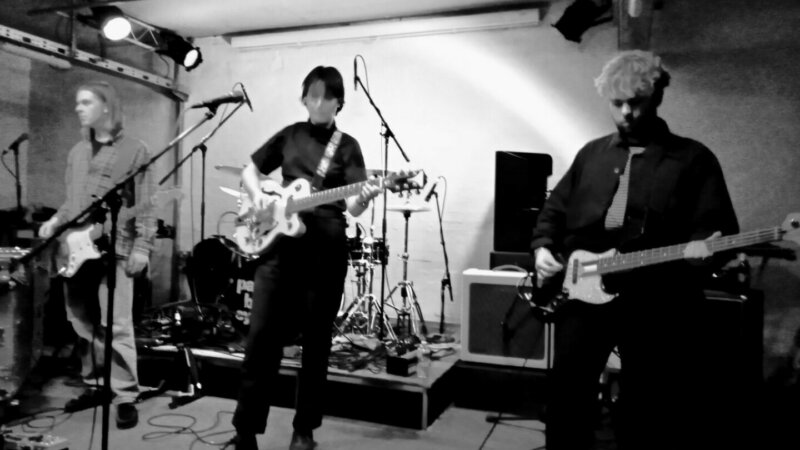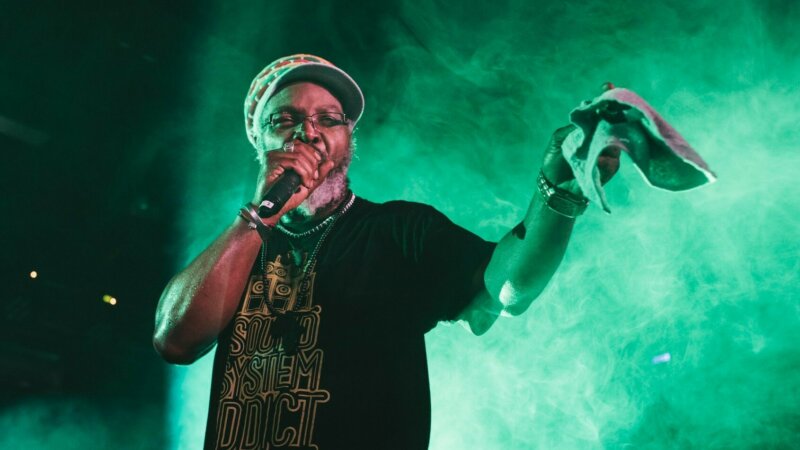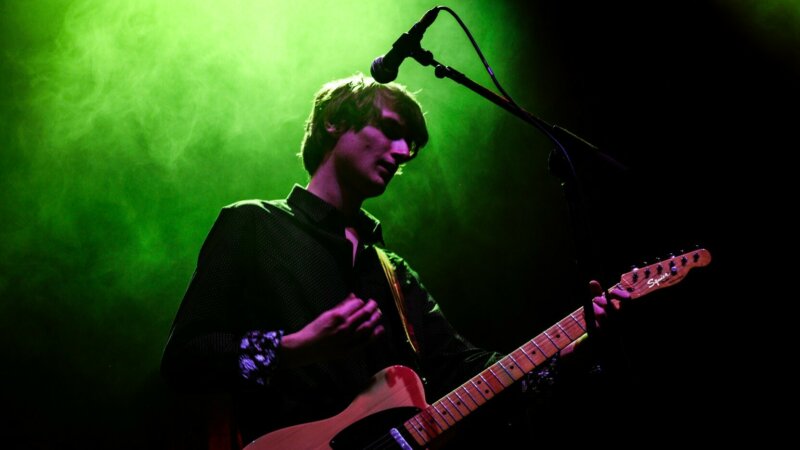B12 / Major Notes / The Moonlandingz
Live
1 April
DINA
It's not often you enter an intimate space to witness the live play of an era-defining record, yet last month DINA played host to an evening filled with musical gems, reinforcing the raw diversity of 90s electronica from its disjointed acidic melodies to its syncopated percussion.
Released in 1993, B12’s Electro-Soma holds a bold presence to this day with its dystopian arrangements and ambience. On the night the duo’s signature sound played a great part in streaming a sense of nostalgia through the audience as they recalled the futuristic sounds of the 90s. Whether audience members were old enough to have experienced that era’s live performances or not, there was a great sense of gratitude as listeners showed reverence for the decade’s sounds.
Warming up was a local Warp influenced musician, John Shima, who reminded us of the distant sounds of Detroit with groovy melodies and old skool rhythms, perfectly preparing the audience for B12. By the time Shima reached the halfway point of his live set, he had the crowd forming together to dance as one.
To begin with, B12 sampled a manipulated voice recording to introduce the LP, stirring up tension and excitement. ‘Obtuse’ is a track which has remained memorable due to its deeply emotional styling conjoined with its unique orbital chimes. ‘Telefone 529’ is another favourite, with its intergalactic melody and prominent bassline, which certainly got the crowd bouncing. ]
Overall, home grown Sheffield promoter LOOP held a commendable evening that will remain long in the memory of all those who attended what was an extremely special event.
Georgia Smith
|
30 April
Yellow Arch
Like time warping straight back to the 60s, Yellow Arch Studios could not have been a more appropriate venue for this soul and R&B soiree. The round tables which bordered the dancefloor were illuminated by warm red lighting, making the event reminiscent of a real nightclub in 60s America. Leaving with a headache from the loud, gravelly sound system wasn’t what I was hoping for, but perhaps the crackle was what made that mod style all the more authentic.
What really made the evening was not the tune selection itself, but the attendees’ reaction to it. Jiving experts in their slidey shoes took to the floor, all while adhering to some sort of dancing code which could only be understood by the veterans themselves. The dancers took turns at showing their moves, albeit in a very individual fashion. No smiling was permitted. The old timers had even anticipated the heat their moves would bring and brought along fans to ward off any sweatiness. The partygoers were either having the time of their lives, feeling the love and joy in their favourite artists’ voices, as expressed through a curious dance code, or they were just showing off.
Ex-Leadmill DJ Mik Parry, who has been rocking the 60s tunes since 1994, was last to take to the decks. The soul pusher sought to revive the mod scene after soul and ska nosedived in the mainstream in the early 2000s and created Sheffield’s Pow Wow Club, a success within its own scene.
At Yellow Arch, Parry certainly revived that sound, exclusively playing movers and shakers, much to the delight of attendees. However, all the dancers really needed was a space largely enough to slide across the floor.
Jennifer Martino
|
14 April
The Harley
The Harley has hosted many nights spanning countless genres, but LSS on Good Friday crossed continents and cultures.
Chris Welch’s set was a clear example, an international medley that began calm, ended energetically and featured dance music from South America, Africa, the UK and elsewhere. Reuben G followed. He was less eclectic, but his style was consistent and had enjoyably fluctuating moments. It set a rhythmic tone upon entering the venue, with soulful music like South African house and UK funky.
Major Notes is a producer and DJ who first found a following through UK funky, but his music and DJ sets go beyond the once immensely popular genre to include selections of afrobeat and afro house. He's the kind of DJ who constantly pays attention to how the audience responds to his music, looking up each time he mixes in a new track.
Tonight he played classic UK funky, like Lil Silva’s ‘Seasons’, remixes of popular afropop tracks, and exceptional tracks from his own catalogue, like ‘Dehka’, to deliver the best set of the night. What was unfortunate was that despite him being the main draw, his time behind the decks was the shortest.
That said, this event was a good opportunity to hear international variations on several forms of dance music, as well as great music from popular genres you wouldn’t hear at most nights in the UK.
Akeem Balogun
|
1 April
Leadmill
There is a real buzz of expectancy from a packed Leadmill as we wait to greet the return of everyone's favourite fictional psych-analogue supergroup.
The main support tonight is South London band Goat Girl, who since releasing their debut single six months ago have attracted frenzied attention after inevitably and lazily being compared to all-female DIY royalty The Slits. Clattering drums and jangly guitars are sometimes neatly offset with close harmonies, recalling their folky roots. They play ten songs in a feisty 25 minute set, with jaunty B-side 'Scum' being particularly effective.
Moonlandingz singer Lias Saoudi's previous excesses aren't as excessive this time around (see last month's Now Then for the graphic details). The seven-piece concentrate on playing amped-up, wigged-out versions of songs from the new album, Interplanetary Class Classics. This isn't just a case of turning everything up to 11. It involves playing with an intensity that borders on psychosis, but in a channelled, controlled kind of way. The strobe lighting and deep rumblings from the twin synths summon up visions of a bacchanalian hall of mirrors from hell.
During 'I.D.S.', a gimped doppelgänger is paraded and humiliated on stage before being discarded into the crowd ("Keep him", sneers Saoudi). Bass and drums provide a particularly solid bedrock and, despite his wild man histrionics, Saoudi possesses a powerful, flexible voice. Playing his onstage alter ego Johnny Rocket, he yields the spotlight regularly to fellow vocalist Rebecca Taylor of Slow Club, in the process becoming an unlikely sybaritic, gentlemanly oxymoron. The set reaches a crescendo with both crowd and band co-creating a sonic, kaleidoscopic Grand Guignol.
Pete Martin
)






